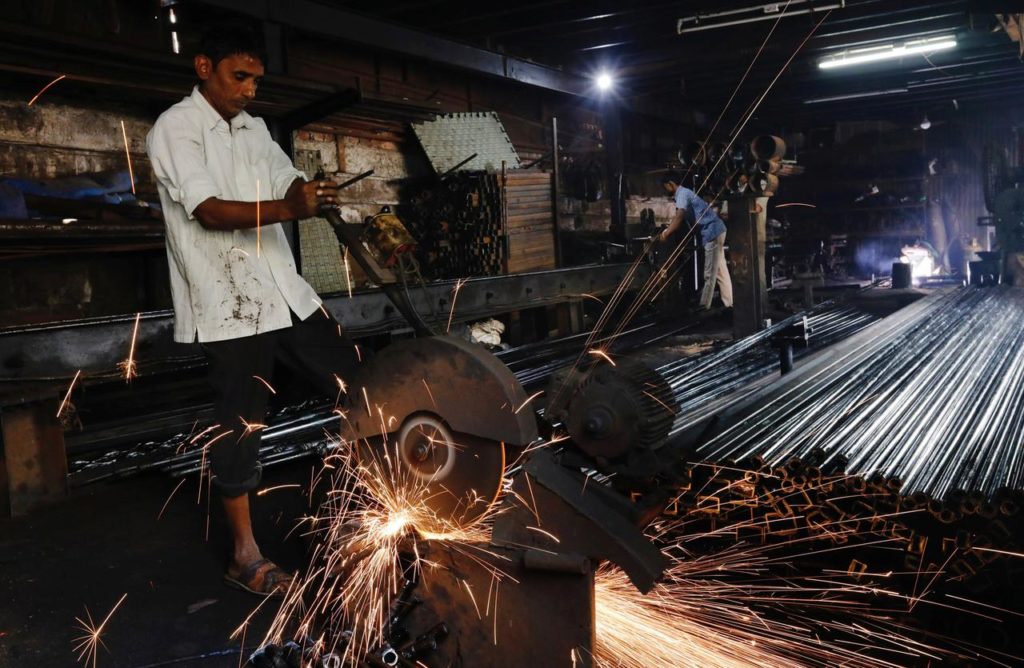‘Inherent Inertia Has Set In, In Past 11 Years’
Jul 25, 2025 | Pratirodh Bureau
FILE PHOTO: Workers make pipes used for drilling, at a factory in an industrial area in Mumbai. Due to the "disastrous economic policies" of the Modi dispensation, "which lack both vision and action", the economy is reeling at a sub-par growth rate, Congress leader Mallikarjun Kharge alleged
Congress chief Mallikarjun Kharge has emphasized the urgent need for impactful second-generation economic reforms in India, referencing the landmark liberalization budget of 1991. He expressed concern that an “inherent inertia” has taken hold of the Narendra Modi government over the past 11 years, hindering necessary progress.
Kharge criticized the current administration’s economic policies, labeling them as “disastrous” and devoid of both “vision and action.” He stated, “The economy is reeling at a sub-par growth rate,” highlighting the widening inequality and stagnation in wage growth. He pointed out that household savings are dwindling, youth unemployment is rampant, and the middle class and poor are being exploited to benefit a select few. “We are facing a trade war, which would hurt both our agriculture and manufacturing sectors,” he added, underscoring the multifaceted challenges confronting the nation.
Reflecting on the significance of the 1991 budget, Kharge noted that it marked a “pivotal moment” for India, ushering in transformative changes under the leadership of then-Prime Minister P.V. Narasimha Rao and Finance Minister Manmohan Singh. He remarked, “Under their guidance, India embarked on a transformative journey with a series of economic reforms that played a pivotal role in shaping the middle class for generations to come.” This historical context serves as a backdrop for his call to action today.
The Congress party takes immense pride in its role in initiating economic liberalization, which Kharge described as a “landmark achievement” that significantly spurred inclusive growth and lifted millions out of poverty. He asserted, “Today, we once again face an urgent need for impactful, robust second-generation economic reforms.” However, he lamented that despite the critical nature of these reforms for the middle class and marginalized communities, “there is an inherent inertia that has set in the last 11 years to take bold decisions.”
Kharge’s remarks come amid ongoing criticism from the Congress party regarding the Modi government’s economic management. He pointed to rising prices, decreasing private investment, and stagnating wages as pressing issues that are adversely affecting the common people. “The issues we face today are not just economic statistics; they represent the struggles of everyday citizens,” he stated, emphasizing the human impact of these policies.
The Congress leader’s comments resonate with a broader narrative of discontent regarding the current economic climate in India. He urged the government to break free from its inertia and take decisive action to implement reforms that would benefit all segments of society. “We cannot afford to ignore the voices of the people who are suffering due to these policies,” Kharge asserted.
Kharge’s call for a renewed focus on economic reforms reflects a deep concern for the future of India’s economy and its citizens. Lessons from the past, particularly the significant changes initiated in 1991, should guide current policymakers in addressing the pressing challenges of today. “It is time for the government to act with vision and purpose, to ensure that the benefits of growth are shared equitably among all Indians,” he said, reinforcing the need for a collective effort to revitalize the economy and restore hope for a better future.
